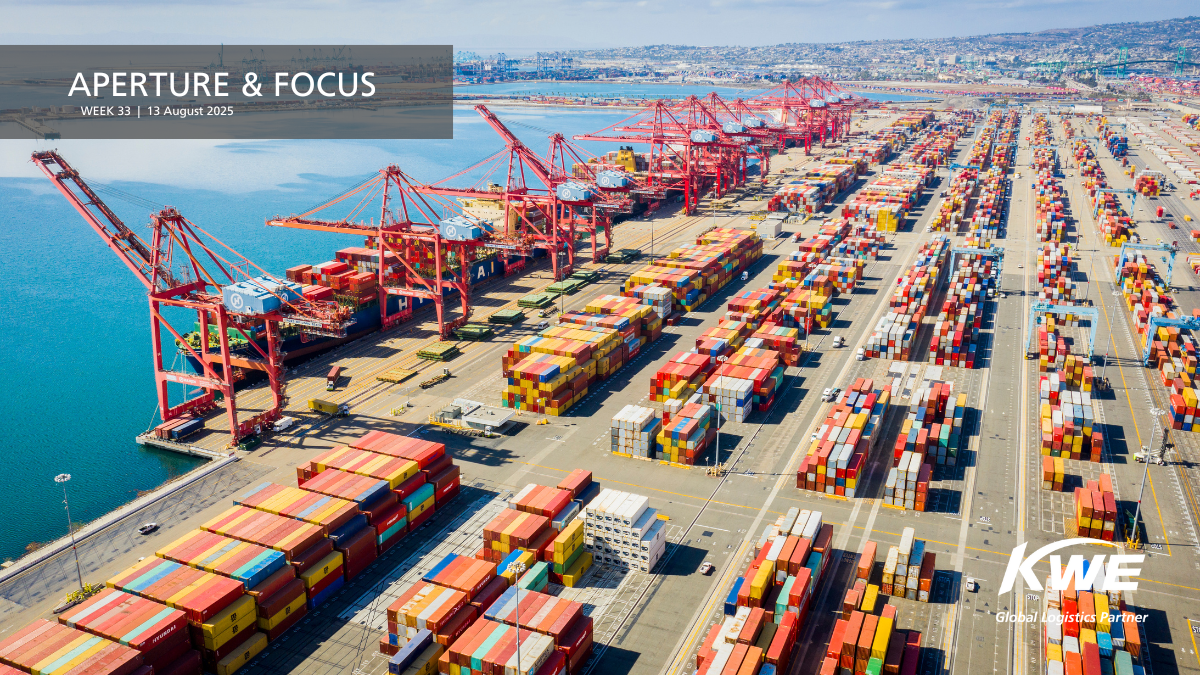Quote
Aperture & Focus 2025: Week 33

Global Aperture
U.S. President Donald Trump signed an executive order on August 11th extending the pause on elevated U.S. tariffs for Chinese goods imports into the country by 90 days, preventing them from reverting to peak levels announced in April. The decision follows late July trade talks in Stockholm and delays the tariff deadline until mid-November. The suspension maintains current duty rates at 30% for U.S. tariffs on Chinese goods and 10% for China on goods imported from the U.S.
The United Kingdom and India formally signed a comprehensive Free Trade Agreement in July 2025, eliminating tariffs on 99% of Indian exports to the UK and reducing duties imposed by India on key UK goods such as aerospace components, electronics, and medical devices. The deal is expected to double bilateral trade to US$120 billion by 2030 and significantly boost air cargo volumes, particularly along major corridors between Indian metro hubs and UK airports.
Weekly vessel capacity on Asia–Europe trade lanes has become over twice as volatile since the pandemic according to recent analysis from supply chain research firm Sea-Intelligence, with average fluctuations rising from 12.3% (pre-2020) to 29.6% (between 2021–2025). With little indication of slowdown well into 2025, this cargo flow is straining European ports and contributing to persistent congestion, as terminals face irregular vessel sizes, blank sailings, and schedule shifts.
Regional Focus
Americas
United States: U.S. Customs and Border Protection (CBP) is preparing to enforce port fees on China-linked vessels starting October 14th. The tiered fees apply to Chinese-owned, operated, or built ships and range from $18 to $140 per ton depending on vessel type and ownership. Non-payment may result in denied port access and cargo operations.
According to new analytics released on August 8th, California’s Port of Long Beach had its busiest July on record, moving 944,232 twenty-foot equivalent units (TEUs) and marking its third-highest monthly volume in the port’s history. Despite the strong performance, port officials expect volumes to decline in the second half of 2025 due to continued U.S. trade policy uncertainty.
Mexico: The country inaugurated its first new seaport in two decades, Puerto del Norte, on August 2nd. Located near the U.S.–Mexico border, the Gulf Coast port seeks to improve transit times for northeastern states and strengthen nearshoring efforts.
Canada: Dozens of active fires in Canada have caused hazy skies across the country and several U.S. states, leading to flight delays at Boston Logan International Airport (BOS) on August 4th due to reduced visibility. The wildfires continue to impact air quality, prompting new smoke advisories across the Upper Midwest and Northeast U.S., from August 11 to 12th.
Asia-Pacific
Taiwan: Officials are evacuating residents and suspending transportation services as Typhoon Podul nears the southeastern coast with landfall expected on August 14th. Authorities canceled multiple sea routes and dozens of domestic and international flights.
India: India and Singapore reaffirmed their commitment to developing a Green and Digital Shipping Corridor during a leadership forum hosted in Mumbai as part of preparations for India Maritime Week 2025. Government officials and industry leaders emphasized the corridor’s potential to accelerate low-emission technologies and maritime connectivity, with a formal agreement expected in September.
Bangladesh: A newly imposed 20% U.S. counter-tariff on Bangladeshi exports took effect on August 7th, triggering a sharp export surge from Chattogram Port as shippers raced to beat the deadline. July container exports rose to 99,000—up from the usual 60,000–65,000—with most U.S.-bound cargo moving through Chattogram’s inland depots, overwhelming infrastructure and prompting priority handling for exporters.
Europe, Middle East & Africa
The European Union (EU) launched a public consultation to review key airport regulations affecting flight schedules, pricing, and ground services, with input open through October 28th. The review will focus on the slot regulation, ground handling directive, and airport charges directive.
Germany: Deutsche Bahn has closed the Hamburg–Berlin rail corridor until at least April 30, 2026, to complete a major renovation aimed at boosting reliability and capacity. The line carries up to 130 freight trains per day, and traffic will be rerouted during the construction period.